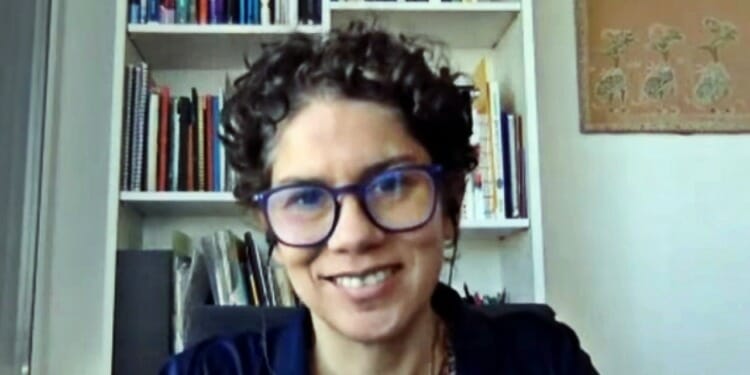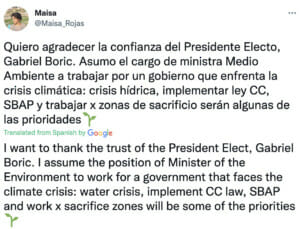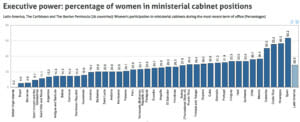Chile has a new government and even before taking office and operating, it has broken a record of sorts, with the highest number of women in key positions, a clear majority – 14 out of 24 – and one of them, María Heloísa (Maisa) Rojas, taking the challenging post of Minister for the Environment.
Maisa Rojas is an independent Chilean physicist and climatologist. Her long career defending the environment and warning of the dangers of climate change made her the ideal candidate for Minister of Environment in Chile.
She holds a Ph.D. in Atmospheric Physics from the University of Oxford, is an academic at the University of Chile, and director of the Center for Climate Science and Resilience, she is also one of the authors of the Intergovernmental Panel on Climate Change report (IPCC, under the UN) and served as coordinator of the scientific advisory committee for COP25.
“Many of the observed changes in climate are unprecedented over thousands, if not hundreds of thousands of years, and some of the changes that are already occurring, such as continued sea-level rise, may not be reversed for centuries or millennia,” the IPCC report says.
Additionally, in 2018, she was named by then-President Michelle Bachelet as representative of the Presidency of the Republic for the Permanent Presidential Advisory Commission on Climate Change.
Maisa assures that the most urgent thing is to coordinate the work between ministries and thus be an ecologist government; the ministry of the environment must be crosscutting, working across and in cooperation with all relevant ministries.
In an interview for La Tercera she said “I do not feel that just because I am an expert, I will do better than another minister who is not an expert on the subject. Because it is indeed a matter of generating dialogue, of generating trust, and of being able to permeate the issue of the environment and climate change in the other ministries, I am very clear that this is a very important role.”
Rojas states that the country must speed up the process in two ways: to achieve carbon neutrality and mitigate the damage that has already been done and also to build a resilient society to face a climate change that seems unstoppable.
“It is understood that [climate change] is not only an environmental problem but also a social and economic one, which has to do with the country’s development model. Chile has already taken a position on the matter by committing to be carbon neutral by 2050, and that this transition cannot be just any transition, but has to be a just transition,” she told El Mostrador in December 2021.
She points to the interests of future generations, equitably allocating the costs that climate change mitigation and adaptation will bring, in order to protect the individuals and territories that are most vulnerable and have historically suffered the consequences.
She mentioned in an interview with La Tercera that the new program of President-elect Boric addresses mitigation and adaptation and also fair climate action, explaining that these are a response to the fact that we are living in a crisis and that quick actions are required from the whole society.
Among her main priorities as Minister of Environment, she emphasized the creation of the Biodiversity and Protected Areas Service, a bill that has been in Congress for more than ten years.
This is what Maisa said she would do in her first 100 days in the position:
- One: Obtain approval of the Framework Law on Climate Change, although she hopes it will already be approved when she takes office.
- Two: Obtain approval of the Protected Biodiversity Service, to start working on the care of biodiversity and protected areas (although she acknowledges she “doesn’t know if it can be achieved in those 100 days).
- Three: Coordinate the work between ministries in order to be a truly ecological government, which she sees as “the most urgent thing” to do as the Environment Ministry “must be transversal.”
It will be the first cabinet in Chilean history with a female majority
Gabriel Boric will assume his position as president of Chile on March 11. At 36 years of age, he will become the youngest president in Chilean history.
On January 21, the president-elect announced the names of those who will make up his cabinet and, for the first time, the majority of its members will be women.
This is a first considering how the majority of political leaders, worldwide, are men. As noted by UN Women, the United Nations agency dedicated to gender equality and the empowerment of women: “Women’s equal participation and leadership in political and public life are essential to achieving the Sustainable Development Goals by 2030. However, data shows that women are underrepresented at all levels of decision-making worldwide, and achieving gender parity in political life is far off.”
UN Women also pointed to the extended timeframe required to achieve gender parity: “As of 1 September 2021, only 21 percent of government ministers were women, only 14 countries have achieved 50 percent or more women in cabinets. With an annual increase of just 0.52 percentage points, gender parity in ministerial positions will not be achieved before 2077.”
According to Gender Equality Observatory for Latin America and the Caribbean in their analysis Executive power: percentage of women in ministerial cabinet positions:
“Latin America and the Caribbean has seen a discrete increase in women’s participation in presidential cabinets. Compared to the previous period, the region increased by 4 percentage points, reaching an average of 25.5%. This increase was slightly larger in the Caribbean, going from 15.18% to a 19.42% average. The countries in the sub-region with the largest increases were Suriname and Trinidad and Tobago, which more than doubled their averages from 11.8 to 33.3% and from 13.3 to 29.4%, respectively. However, both countries are still a long way from achieving equal participation.”
“In the case of Latin America, three countries have seen significant increases over the previous period: Colombia (+22.41), Costa Rica (+23.74) and Mexico (+17.61). Since 2018, Costa Rica has had a cabinet composed mainly of women with a 55.17%, and Colombia a joint cabinet with a 50%.”
Chilean cabinet: feminine, millennial and intergenerational
With a majority of women in ministerial positions and an average age of 49, Gabriel Boric has demonstrated that his team is highly diverse in gender, political and social terms.
“That we have achieved this is the struggle of thousands of women who have pushed the barriers of what was understood to be possible for a long time and now with the latest feminist wave even more so.” He told BBC News World.
According to Santiago Basabe, Ecuadorian political scientist, professor, and columnist, in his article The underrepresentation of women in ministerial cabinets: The Ecuadorian case in comparative perspective, 1979-2015. “One of the most recurrent ideas holds that presidents coming from parties ideologically oriented to the left prioritize the inclusion of women in their political platforms and, as a consequence, appoint more women ministers”.
Statistics show that there is a systematic exclusion of women in politics and this is a structural problem. There are more and more women with academic preparation and professional experience, but this is not being reflected in the representation in the ministerial cabinets.
The new Chilean government’s cabinet places them as the country with the highest female representation in the region with 58.33%, which would set a precedent for Latin America because the more women in political representation positions, the higher the tendency by other governments to follow the trend.
It is hoped that the different political leaders in Latin America will consider the idea of assigning more women to these functions and that gender asymmetries will be eliminated in government structures.
Editor’s Note: The opinions expressed here by Impakter.com columnists and contributors are their own, not those of Impakter.com. — In the Featured Photo: Maisa Rojas in a TVN Chile interview, January 24, 2022 Featured Photo Credit: Screenshot from TVN Chile Youtube video.












